Security Guard Training Glossary

The following is a glossary of all the popular terms that security officers often use.
access routes: the ways in and out of a building or site
activated: caused to operate, start working, set off
to adjust to: to get used to, to make the best of things
anxious: uneasy, nervous
to arm: to set, to turn on
to assess: to evaluate, to judge
to assume: to believe something to be true without knowing all of the facts
attitude: way of thinking about things
authority: the legal power to control, give orders and make others obey, or a person who has this power
authorized: allowed, permitted
barricade: physical barrier
to challenge: to disobey or resist doing what someone wants
client: the owner or landlord at the place where you are working
combustible: able to catch fire and burn easily
combustion: the process of burning
communication: the sharing of thoughts, ideas, feelings between people
complaint: a formal statement about a problem
comply: to agree to, to go along with
component: part
compulsory: necessary
conduct: the way you act, how you behave
confidential: private
conscious: awake and able to understand what is happening around you
consequences: results
coordinate: work well together
data: facts or information
detailed: complete, includes all the important information
to detect: to notice, to become aware of
to deter: to prevent or discourage
deterrent: something that prevents or discourages someone from doing something that they should not do
to detonate: to cause to explode
device: something that has been made for a special purpose
to disarm: to turn off
discipline: action taken against someone who, it is believed, has done something wrong
discriminate: to treat differently, usually in a negative way
to disrupt: to confuse or upset
to distract: to break someone’s attention away from something
to enforce: to make sure that a rule or regulation is followed
to escalate: to take to a higher level, to make worse
to escort: to go with, to guide perhaps by the arm
escorting: going with someone to protect them
to evacuate: to empty
to evaluate: to assess, to make a judgment
evidence: anything that proves something or gives a reason for believing something
to extinguish: to put out
extinguisher: a device that is used for putting out fires
flammable: burns quickly and easily, or likely to burst into flames and to burn very quickly
flare: an object that produces a bright light and is used as a signal
frustrated: not satisfied because you are unable to get what you want
gear: equipment for an activity, including clothing
gesture: movement of the hands or head to show an idea or feeling
guidance: advice or information for solving a problem or difficulty
guidelines: suggestions to help someone carry out actions
hazard: danger
hazardous: dangerous
hoax, prank: trick or joke
hydrant: a pipe for water with a place where a hose can be attached
identification: proof of who a person is
to ignite: to start on fire
illegal: against the law
incident: unusual event or happening
infrared: heat rays that create a beam that can’t be seen by the human eye
to install: to put in
interaction: a meeting between people when they communicate with each other
intruder: someone who has entered an area that they are not supposed to be in
involvement: participation
to inspect: to look at carefully
issues: things people are worried about
to interact: to say or do things with another person or persons
justified: acting within the law
mechanical: having moving parts such as in a machine
to minimize: to make less, to take to the lowest level
MSDS: Material Safety Data Sheet
neutral: showing no emotion, not taking either side in a disagreement (fight, protest, labour dispute)no matter what your feelings are or who seems to be right
obstacles: things in the way
occupants: the people inside a car, building, etc.
on behalf of: in the interests of, representing
pedestrian: a person who is walking
perimeter: outside edge of an area
to prearrange: to set in place before
predictable: routine, able to know in advance
procedures: ways of doing things
proximity: nearness, how close something is
public relations: how to get along with the public and how you want the public to see you or the organization that you represent
reflective: sending back. Clothing or tape that reflects light helps you to be seen especially at night
regulation: rule
to repel: to push away, to hold off
representative (rep): someone who speaks for others or who brings their concerns / feedback to others
to reset: to set again, to arm again
residue: small amount that is left
responsibilities: duties
responsibility: something that you must do, watch over or take care of
responsible: in charge and likely to take the blame if anything goes wrong
to restrain: to physically control or confine
restraint: control, self-discipline
restricted: limited to only certain people, not for the general public
secure: tightly closed and locked
to secure: to stop people from entering or leaving a site
seizure: the taking away of something from someone
shop steward: a union member who helps others with problems
silhouette: outline
site: the place where you are guarding
slang: very informal language that not everyone understands
stance: how you stand and hold your body
supportive: helpful
surveillance camera: camera that is used to keep watch over an area for intruders or shoplifters
suspicious: strange looking or out of place, guilty looking
testimony: formal statement in court
threat: a chance or promise that something bad is going to happen
to threaten: to say that you will hurt someone
threatening: causing fear, making someone uncomfortable
typical: common, similar to a group
unconscious: not conscious, as if in a very deep sleep
valve: a device that’s used for controlling the flow of air, liquid or gas
vapours: wet gasses, such as steam, that are coming off of a liquid
vibration: rapid shaking movement
visibility: the ease with which one can see things over a distance. This may be affected by light or weather.
waybill: a paper with the details of a shipment, including sender, receiver, and details of the goods being shipped
WHMIS: Workplace Hazard Material Information System. WHMIS uses special symbols to identify containers of hazardous material

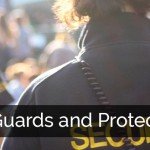



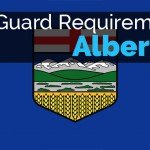

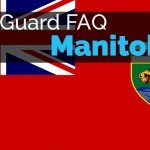
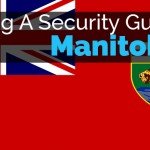
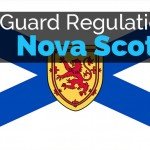
No comments Yet on Security Guard Training Glossary